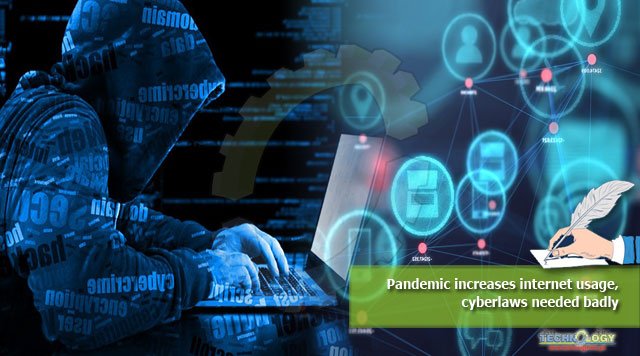Cybercrime is also known as a computer-oriented crime in which a network or computer is used for illegal activities.

Cybercrime has become a wide term in the ongoing technological era where technological innovations have shaken the tectonic plates of every sphere in the world. Committers of cyber-crime use their skills for the purpose of “bringing down websites, stealing data, or committing fraud”.
The Committee on National Security Systems defines the cybercrime as “The ability to protect or defend an enterprise’s use of cyberspace from an attack, conducted via cyberspace, for the purpose of disrupting, disabling, destroying, or maliciously controlling a computing environment/infrastructure; or, destroying the integrity of the data or stealing controlled information.”
Cybercriminals or hackers attempt to steal sensitive information from a computer or electronic device. Hackers not only pose threats to individuals’ rights of privacy but also threaten national security by targeting information related to national security plans, nuclear or other military-related installments, defense systems, and others.
Phishing scams, identity theft scams, online harassment, cyberstalking, and invasion of privacy are major threats. The nature of cybercrime attacks fluctuates from one to the next.
That was the old-time when cyber warfare was fiction but it has become an important part of the military in the ongoing era. The highly advanced countries are also working on the cyberspace as an important strategic domain with special reference to land, air, and sea.
At the national or local level, social media platforms are used for the purpose of harassment, stealing information of others, and using electronic ways to violate human rights to privacy and independence. Even, hackers used their skills and software to hack websites of the government, organizations, or individuals for the purpose of extracting information and blackmailing. These are the new challenges that are being faced by human beings in the ongoing era.
However, there is a problem with the fair implementation of the laws or rules. Cybercrimes are increasing day by day, which threatens the privacy of individuals and organizations, and human rights. Primary rights such as freedom of speech should not be infringed at all under the aegis of such laws, but issues which are being caused by cybercrimes must be tackled such as harassment, stealing individual information and many more
Pakistan is also facing cybercrime-related issues. Human rights are at the brink of destruction because millions of attacks have been conducted and attempted for many years. Prevention of Electronic Crimes Bill (PECB) 2015 was passed by the National Assembly in 2016 for ensuring the applicability of strict laws to counter the erupting digital challenges for human rights. There were severe concerns and apprehensions of the political opposition, the IT industry, civil rights organizations, and civil society. They all termed the bill as controversial and draconian and claimed that the bill would curb human rights, and overreach powers of agencies.
The bill offers “more than three years imprisonment and Rs1 million fine or both for unauthorized access to critical infrastructure information system or data”.
Provisions which empowered the government to cooperate with any a foreign government, organization or agency, 24×7 network for investigation or proceedings relating to an offense or for collecting evidence were also added in the bill. The bill allows a fine of upto Rs 10 million and up to seven years imprisonment, or both, for interference with a critical infrastructure information system or data, with dishonest intention.
Social media channels are used to engage people in terrorist activities by building an appealing narrative by appealing posts and content. People are targeted and contacted to join militant or terrorist groups that disrupt the law and order situation in the country. So, the bill also covered the crimes related to terrorism by providing a punishment of “up to seven years imprisonment, Rs10 million fine or both for the glorification of an offense relating to terrorism, any person convicted of a crime relating to terrorism or proscribed individuals or groups. Glorification is explained as “depiction of any form of praise or celebration in a desirable manner”.
Even, if information related to your identity is used without getting permission, you may apply to the authorities to secure, destroy or prevent transmission of your information.
There are many different types of punishment in the bill which are still opposed by the multiple segments of society. No doubt, the punishments are severe and the bill overreached the powers of law and enforcement agencies, but that is the need of the time. According to Mohsin Jawa who is CEO of Wangard International– a leading Information Technology company and dealing with cyber security protocols– there must be fair implementation of the laws for rapid outcomes for the protection of privacy and human rights. He further opines that there should not be aby gap between the cybercrime laws and human rights. These laws ought not to square up to human rights at all. Mr. Jawa enunciates that the brand registering and trademark recognition process must be fair and quickest in the country, because it took much time to recognize a brand or logo in Pakistan which poses threats to intellectual property right too.
However, there is a problem with the fair implementation of the laws or rules. Cybercrimes are increasing day by day, which threatens the privacy of individuals and organizations, and human rights. Primary rights such as freedom of speech should not be infringed at all under the aegis of such laws, but issues which are being caused by cybercrimes must be tackled such as harassment, stealing individual information and many more.
This news was originally published at pakistantoday.com.pk